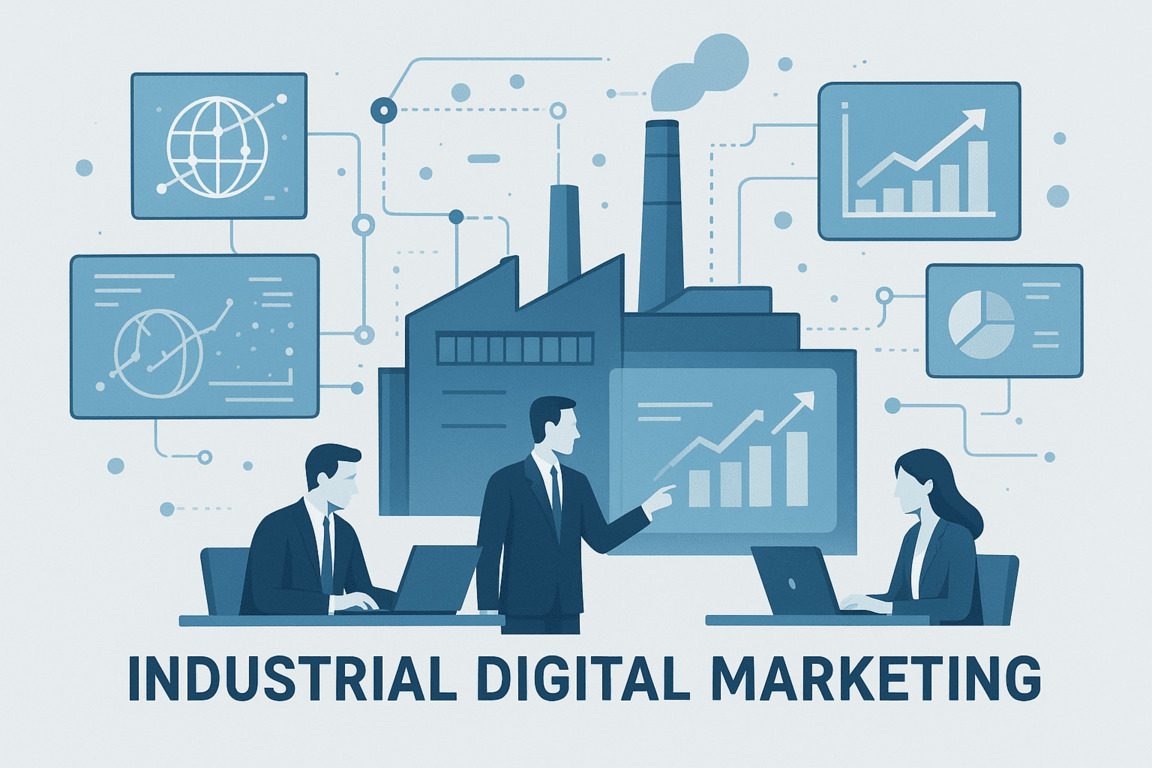Digital marketing is transforming the construction industry. It enables companies to connect with potential clients and showcase their expertise more effectively than traditional methods. Establishing a strong online presence is crucial for construction businesses. This article explores various strategies to enhance visibility, generate leads, and build effective digital marketing campaigns tailored to the construction sector.
Understanding Digital Marketing in the Construction Industry
In this era of technology, the construction industry must adapt to the advancements of digital marketing to effectively reach potential clients and enhance business growth. A useful source is the NYC Department of Buildings, which provides insights and resources relevant to construction companies operating in New York City, helping businesses understand local regulations, trends, and opportunities to connect effectively with their target audience.
The Importance of a Strong Online Presence for Construction Companies
A robust online presence has become critical for construction firms aiming to thrive in a competitive market. This presence not only encompasses a well-designed website, but also extends to social media platforms and online directories. A strong online representation enables companies to showcase their completed projects and client testimonials, allowing potential customers to gauge the quality of services offered.
When construction companies establish an appealing online identity, they create an opportunity to connect with clients at various stages of their decision-making process. A solid digital footprint can lead to significant increases in trust and credibility, necessary factors in securing new contracts.
How Digital Marketing Enhances Visibility and Lead Generation
Digital marketing has transformed how construction companies attract and engage potential clients. Through targeted online advertising and content marketing, businesses can enhance visibility and establish their brand identity. Techniques such as search engine optimization (SEO) improve the chances of appearing on the first page of search results, making it easier for prospective clients to find services when they need them the most.
- Content creation, such as blog posts and project showcases, positions companies as industry leaders.
- SEO strategies focus on optimizing keywords relevant to construction services.
- Online reviews and client testimonials amplify a company’s reputation and contribute to lead generation.
Online reviews and client testimonials amplify a company’s reputation and contribute to lead generation. Reports like the latest construction marketing statistics from WebFX highlight how digital strategies such as SEO, paid advertising, and social media are driving measurable results for construction firms across the industry.
Key Differences Between Traditional and Digital Marketing Strategies
Understanding the distinct characteristics between traditional and digital marketing strategies is crucial for construction companies. Traditional marketing methods, such as print advertising or cold calling, often lack measurable results and can be costly.
- Digital marketing offers real-time analytics, allowing businesses to track engagement and conversion rates significantly more effectively.
- Unlike traditional methods that have a broad reach, digital techniques provide targeted approaches, focusing on specific demographics and interest groups.
- Digital campaigns can be adjusted quickly based on performance trends, providing a more agile marketing strategy.
The transition from traditional advertising to digital platforms marks a significant evolution in how the construction industry markets its services, driving enhanced efficiency and effectiveness.
Building an Effective Digital Marketing Strategy for Construction Companies
Creating a robust digital marketing strategy is essential for construction companies aiming to thrive in the competitive market. This involves understanding the audience, setting measurable goals, and utilizing data analytics effectively.
Defining Target Audience and Understanding Client Preferences
Identifying the ideal client is crucial for construction firms to tailor their marketing efforts. Factors to consider include:
- Demographics: age, location, income level, and profession.
- Project Needs: type of construction services required, such as residential, commercial, or industrial.
- Values and Preferences: understanding aspects like sustainability practices, quality standards, and budget considerations.
Engaging in market research, utilizing surveys, and analyzing social media trends can provide insights into what potential clients are seeking. This knowledge shapes the messaging and offerings to resonate with the audience effectively.
Setting Goals for Lead Generation and Brand Awareness
Creating specific, measurable, achievable, relevant, and time-bound (SMART) goals is foundational for an effective marketing strategy. Construction companies can establish objectives like:
- Increasing website traffic by a certain percentage within a specified timeframe.
- Generating a target number of qualified leads each month.
- Enhancing brand recognition through social media engagement metrics.
Regularly evaluating these goals ensures that marketing strategies remain aligned with overall business objectives. This approach not only drives lead generation but establishes a company’s reputation in the market as well.
Integrating Data-Driven Insights into Marketing Efforts
Data analytics plays a vital role in refining digital marketing strategies. Utilizing tools to track website performance, lead conversion rates, and social media interactions allows companies to make informed decisions. Effective practices include:
- Regularly monitoring website analytics to understand visitor behavior.
- Adjusting marketing campaigns based on performance data and client feedback.
- Employing A/B testing to optimize content and advertisement effectiveness.
Incorporating these insights leads to more efficient marketing strategies and can significantly enhance lead generation efforts.
Content Marketing and SEO for Construction Companies
Effective content marketing and SEO strategies are essential for construction companies to attract potential clients and enhance their online presence. By delivering valuable information and optimizing their websites, businesses can generate quality leads and build lasting relationships.

Creating Valuable Content to Engage Potential Clients
Producing high-quality content is crucial in showcasing the expertise of a construction company. Informative blogs, articles, and videos that address common challenges in construction can position a company as a trusted resource. Engaging content not only builds audience trust but also encourages users to share it, expanding reach. Some effective content types include:
- How-to guides related to construction projects
- Case studies highlighting successful projects
- Industry news and trends
- Tips for maintaining and managing construction sites
SEO Strategies for Construction Websites and Blogs
Search Engine Optimization (SEO) enhances the visibility of construction websites in search engine results. Implementing targeted keywords related to construction services helps attract organic traffic. Key strategies for SEO include:
- Optimizing website structure and metadata
- Incorporating relevant keywords naturally within the content
- Regularly updating the blog with fresh content
- Utilizing headers and subheaders effectively for better readability
Local SEO to Capture Area-Specific Leads
Local SEO strategies are vital for construction companies, as they often operate within specific geographical areas. Optimizing for local searches increases visibility among potential clients searching for nearby services. Techniques to enhance local SEO include:
- Creating a Google My Business profile
- Utilizing location-based keywords
- Encouraging customer reviews and testimonials on local platforms
Using High-Quality Images and Videos to Showcase Completed Projects
Visual content plays a significant role in the construction industry. High-quality images and videos of completed projects not only captivate potential clients but also provide a tangible representation of a company’s capabilities. Best practices for visual content include:
- Utilizing professional photography and videography
- Including before-and-after shots to highlight transformations
- Creating video walkthroughs to give clients a virtual experience of projects
Leveraging Social Media Platforms for Construction Marketing
In today’s digital landscape, utilizing social media effectively is crucial for construction companies aiming to enhance their marketing efforts. Various platforms offer unique opportunities for engagement and visibility.
For construction companies aiming to strengthen their digital presence and generate more qualified leads, partnering with experts in search engine optimization can make a significant difference. If you want to explore proven strategies tailored to your industry, check out our dedicated page on SEO in New York and discover how professional SEO services can help your business grow online.
Choosing the Right Platforms: LinkedIn, Facebook, and Instagram
The selection of social media platforms is vital in reaching the target audience effectively.
- LinkedIn: This platform is ideal for B2B interactions. It allows construction companies to network with industry professionals, share expertise, and showcase projects.
- Facebook: With a broad user base, Facebook is useful for connecting with homeowners and general contractors, sharing updates, and promoting events or offers.
- Instagram: Primarily visual, Instagram is perfect for displaying completed projects through high-quality images and videos, making it an engaging way to capture potential clients’ attention.
Sharing Valuable Content and Engaging with the Audience
Content shared on social media needs to be not just promotional but also valuable to the audience. Creating posts that educate potential clients or provide insights into construction trends fosters engagement.
- Posts can include informative articles, construction tips, or project highlights.
- Engaging with comments and messages in real-time builds trust and establishes a community around the brand.
Social Media Advertising and Targeted Campaigns
Investing in social media advertising expands reach significantly. Targeted campaigns allow for precise audience segmentation based on demographics and interests.
- PPC (Pay-Per-Click) advertising on platforms like Facebook can drive immediate traffic and visibility.
- Social media ads can promote specific services or highlight ongoing projects to attract more tailored leads.
Building Relationships Through Real-Time Community Engagement
Active engagement with the community on social media is vital for relationship-building. Responding to inquiries and participating in discussions makes construction companies more approachable.
- Real-time interaction helps in cultivating a loyal audience that is likely to refer services and share content.
- Hosting live Q&A sessions or virtual tours of projects can further enhance community relations.
Paid Advertising Strategies in the Construction Industry
Implementing effective paid advertising strategies can substantially enhance visibility for construction companies. This approach facilitates immediate outreach to potential clients actively searching for construction services.
Pay Per Click (PPC) Campaigns for Immediate Visibility
PPC campaigns are among the most effective methods to achieve quick exposure in the competitive construction market. These campaigns allow companies to bid on keywords relevant to their services, ensuring that ads appear at the top of search engine results. By utilizing platforms like Google Ads, construction firms can target specific terms that potential clients are likely to use.
A well-structured PPC campaign not only drives traffic to a company’s website but also boosts brand recognition. It’s crucial to create compelling ad copy that highlights unique selling propositions (USPs) to entice clicks. Additionally, employing geo-targeting can assist businesses in focusing on local demographics, connecting with clients who are geographically relevant to their services.
Targeting Demographics, Interests, and Behaviors for Qualified Leads
Precision in targeting is critical for maximizing the effectiveness of advertising efforts. Understanding buyer personas and utilizing demographic information allows construction firms to create highly tailored campaigns. Advertising platforms provide options to focus on various segments based on age, location, and interests.
- Age: Tailoring messages for different age groups can enhance engagement and relevance.
- Location: Localizing ads ensures they reach potential clients in specific areas where services are offered.
- Interests: Targeting based on user interests can attract clients who prioritize specific types of construction services.
By strategically selecting the right audience, companies can increase the chances of converting leads into customers, improving overall campaign ROI.
Integrating Tools Like Building Radar for Better Campaign Targeting
Incorporating analytical tools such as Building Radar can significantly refine targeting efforts. This tool aids in identifying upcoming construction projects, allowing companies to position their services more efficiently. By understanding project timelines and locations, construction firms can tailor their advertising strategies to meet demand precisely when and where it arises.
Moreover, the integration of machine learning and data analytics facilitates continuous optimization of ad campaigns. Analyzing performance metrics ensures that resources are allocated effectively, enhancing overall campaign efficiency. This data-driven approach can lead to more impactful advertising results, reinforcing the presence of construction companies within their target market.
To maximize the impact of paid advertising in the construction sector, it’s essential to work with professionals who understand how to design, optimize, and scale campaigns effectively. Discover how partnering with a specialized Google Ads management agency can help your company reach the right audience, generate qualified leads, and achieve sustainable growth through data-driven advertising strategies.
Email Marketing for Nurturing Leads and Clients
Email marketing serves as a powerful tool within the construction industry, allowing companies to keep in touch with leads and clients through targeted communication. By delivering relevant content, businesses can nurture relationships and foster client loyalty.
Segmenting Email Lists Based on Client Preferences and Behaviors
Effective email marketing hinges on the ability to segment email lists. By categorizing potential leads and existing clients based on their preferences and interactions, companies can tailor content to meet specific needs. This segmentation can be based on several criteria, including:
- Past project engagement
- Service interests
- Geographic location
- Previous interactions with marketing materials
Utilizing segmentation allows for more personalized communication, which can lead to higher open and click-through rates. Understanding client behaviors also aids in crafting messages that resonate, ensuring that each recipient receives content that aligns with their interests.
Creating Personalized Campaigns with Valuable Content
Personalization goes beyond simply addressing clients by their names. It involves creating content that speaks directly to their interests and needs. Construction companies can achieve this by:
- Developing targeted newsletters highlighting relevant topics and trends in the industry
- Offering informative resources such as guides, case studies, and eBooks that address common pain points
- Sharing testimonials and success stories that align with the client’s project type
When content is valuable and relevant, it increases the likelihood of engagement and fosters a sense of trust. Personalization helps clients feel understood and valued, ultimately leading to stronger relationships.
Sharing Updates on New Services and Completed Projects
Keeping clients informed about the latest offerings and successes is essential. Email marketing provides an ideal platform for sharing updates on:
- New services or capabilities within the company
- Recent successful projects that showcase expertise
- Industry trends and innovations that may impact their interests
Regular updates ensure that clients remain engaged and aware of what the company can offer. This consistent communication nurtures leads through the sales funnel and encourages repeat business from existing clients.
Utilizing Data Analytics to Optimize Digital Marketing Efforts
Data analytics plays a critical role in refining marketing strategies, ensuring that campaigns are effective and aligned with business goals.
Tracking Website Traffic and Conversion Metrics
Monitoring website traffic is essential for understanding how potential clients engage with a company’s online presence. Tools like Google Analytics provide insights into visitor behavior, including:
- The number of visitors
- Pages viewed per session
- Bounce rates
- Average session duration
Conversion metrics are equally vital, as they measure how well the website achieves its goals, such as lead captures or inquiries. Analyzing these metrics allows construction companies to identify successful landing pages or content that attracts potential clients.
Monitoring Social Media Engagement and Campaign Performance
Engagement on social media platforms reveals how well a company connects with its audience. Key performance indicators (KPIs) include likes, shares, comments, and follower growth. These metrics help assess the effectiveness of content and identify areas for improvement. Campaign performance can be evaluated using tools that track:
- Click-through rates (CTR)
- Return on ad spend (ROAS)
- Engagement rates for specific posts
By continuously monitoring social media metrics, companies can adjust their content strategy to better resonate with their audience.
Adjusting Strategies Based on Analytics Insights
Insights gained from data analytics should guide tactical adjustments for maximizing marketing efforts. Companies must regularly review performance data to identify trends or anomalies that can inform upcoming strategies. This may involve:
- Refining target demographics based on audience behavior
- Altering content types or formats to enhance engagement
- Reassessing budget allocations for high-performing campaigns
Through this data-driven approach, construction firms can enhance their marketing strategies, ensuring they are effectively reaching and engaging their target audience. This adaptability is crucial in a competitive landscape, allowing for sustained growth and lead generation.
Tools and Technologies That Help Construction Companies in Digital Marketing
In the rapidly evolving landscape of digital marketing, construction companies can leverage an array of innovative tools and technologies to enhance their marketing efforts. These resources not only improve efficiency but also optimize lead generation and client engagement.
Overview of Building Radar and Similar Lead Generation Tools
Building Radar is one of the leading tools designed specifically for the construction industry, providing invaluable insights into emerging projects. This platform utilizes advanced algorithms to identify new construction opportunities by analyzing a variety of data sources. Companies can track project stages, monitor competitors, and discover potential clients more effectively.
In addition to Building Radar, other lead generation tools play crucial roles in streamlining marketing efforts. Some of these include:
- Construction Leads: Focused on providing a comprehensive database of upcoming construction projects.
- CoConstruct: This tool integrates project management with client communications, allowing seamless interactions.
- Hootsuite: While not specific to construction, it enables effective management of social media campaigns.
Benefits of Automation in Marketing Campaigns
Automation tools transform how construction companies manage their marketing efforts. By automating repetitive tasks, businesses can focus on strategic activities that drive growth.
Benefits of implementing automation include:
- Time Efficiency: Reduces time spent on manual tasks like email scheduling and social media posting.
- Consistent Messaging: Ensures that marketing messages are delivered on time without lapses.
- Better Analytics: Automates tracking and reporting, providing actionable insights without manual intervention.
Integrating Multiple Platforms for Enhanced Marketing Reach
A comprehensive digital marketing strategy often requires integration across various platforms. Harmonizing social media, email marketing, and website analytics allows construction companies to create a cohesive brand message.
Key aspects of effective integration include:
- Centralized Data: Collecting data from all marketing channels in one place enables more informed decision-making.
- Cohesive Branding: A unified approach to branding helps in establishing a stronger online presence.
- Efficient Resource Allocation: Understanding which channels perform best allows for optimized budget allocation.







